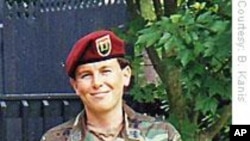During Oct. 12 demonstrations in the nation's capital, some current and former service members urged U.S. lawmakers to repeal both a 1993 "Don't Ask Don't Tell" policy that prevents openly homosexual men and women from serving in the armed forces and a stricter legal ban.
"Don't Ask Don't Tell" doesn't work for some
While the "Don't Ask Don't Tell" policy adds flexibility to the law against gays in the military, some oppose the policy. Becky Kanis, a lesbian West Point graduate, was the first woman to become a Special Operations company commander. She says the strain of living a double life caused her to end her military career.
"I felt was I wasn't able to fully participate in my unit and in the group dynamics, because there was always some part of myself I wasn't able to disclose [even in benign, non-sexual conversations]. That is corrosive to morale and it's what happens with lots of gay and lesbian soldiers," Kanis says.
Lieutenant Dan Choi, another gay West Point graduate, was willing to accept the "Don't Ask Don't Tell" policy, until he returned from serving as an Arabic linguist in Iraq and fell in love. Choi then acknowledged openly that he is gay.
<!-- IMAGE -->Choi says his friends in the military were supportive and asked to meet his partner.
"You met my girlfriend or my wife, so why shouldn't I meet your boyfriend?" Choi says, "I could easily have told them [I was gay]. But because of 'Don't Ask Don't Tell,' psychologically, and even spiritually, I was trapped!"
But some say that Choi's trap was of his own making since no one forced him to join the military. Eventually, Choi was asked to leave active duty due to his admission.
Gay activists challenge arguments to uphold the ban
<!-- IMAGE -->"The military is not just another equal opportunity employer, and it's not there to conduct social experiments," says Elaine Donnelly of the Center for Military Readiness, a prominent non-profit group that opposes gays in the military. "It's there to defend the country."
"Sarah," a career Army officer who has kept her long term committed lesbian partnership with another officer a secret under "Don't Ask Don't Tell," says that objections to permitting gays in the military are misguided. For example, she says that she could not flaunt her gay relationship even without the ban.
"There are already rules in the military about public displays of affection and fraternization and sexual-type conduct in the barracks and in uniform, so I don't buy the argument that it will be a problem," she says.
Policies on gays may impact military capabilities
Dan Choi says that his departure from military service impacts more than his career. "You have to look at the entire unit that now has one less capable soldier, one less Arabic linguist. And it's not just Arabic linguists. It's medical professionals, lawyers, infantrymen pilots [and others]," Choi says.
He adds that discharging openly gay service members violates a tenet he learned at West Point that, "everybody is important for the mission, and that for the team to lose somebody is really to be less effective."
But those in favor of the ban say that repealing it would also lead to a loss of military personnel. Elaine Donnelly of the Center for Military Readiness cites results of a survey of 2000 servicemen and women conducted by the independent "Military Times" newspaper. Ten percent of survey respondents say they would leave the service if homosexuals were allowed to serve openly and 14 percent would consider doing so.
"And when you lose thousand of good people in the mid-level ranks and in occupations that are difficult to replace, such as special operations forces, infantry battalions, [and] submarines, you are doing great harm," Donnelly says.
Becky Kanis likens anti-gay service members to whites who left the service during the 1950s after racial segregation in the military was outlawed. She believes that laws should not be retained or repealed merely because some people are uncomfortable with them.
The controversy continues – for now
<!-- IMAGE -->In a speech to the Human Rights Campaign, the nation's largest gay rights organization, President Obama said that that he intends to end the "Don't Ask, Don't Tell" policy, and to work with Congress to repeal the federal law that forbids gays from serving in the military. While the future status of gays in the military remains uncertain, it could eventually become a non-issue, says Dan Choi. He believes the younger generation of soldiers may be far more accepting of gays and other alternative lifestyles than were their predecessors.




